President Xi Jinping Chairs the Inaugural China-Central Asia Summit and Delivers a Keynote Speech
He emphasized the need to work together for a China-Central Asia community with a shared future featuring mutual assistance, common development, universal security and everlasting friendship.
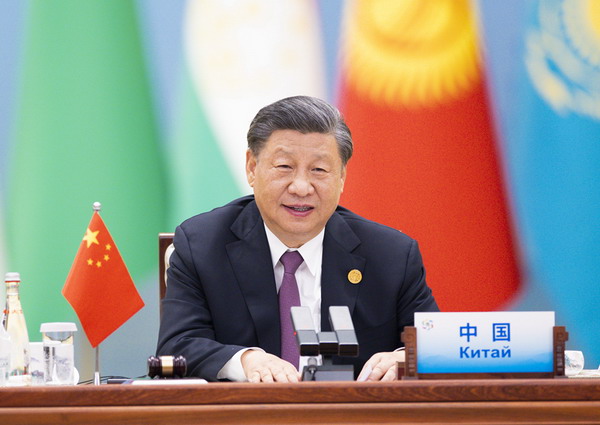
On the morning of 19 May, President Xi Jinping chaired the inaugural China-Central Asia Summit in Xi'an, Shaanxi Province. President Kassym-Jomart Tokayev of Kazakhstan, President Sadyr Zhaparov of Kyrgyzstan, President Emomali Rahmon of Tajikistan, President Serdar Berdimuhamedov of Turkmenistan and President Shavkat Mirziyoyev of Uzbekistan attended the Summit. In an amicable atmosphere, the presidents reviewed the history of friendly exchanges between China and the five Central Asian countries, took stock of cooperation experience in various fields, and envisioned future cooperation directions. With the future in mind, they agreed to work together for an even closer China-Central Asia community with a shared future.
Xi'an in May is decorated with blooming flowers and brimming with vitality. At the Xi'an International Convention Center by the Bahe River, the logo of the China-Central Asia Summit shone under the flying national flags of China and the five Central Asian countries. This millennia-old ancient capital was hosting a gala where history meets the future.
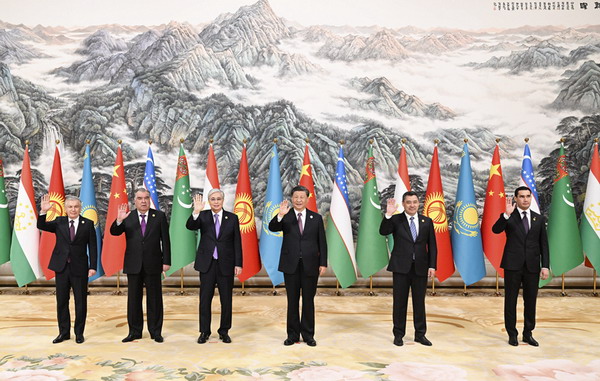
Presidents of the five Central Asian countries arrived one after another. President Xi shook hands and took a group photo with them.
At around ten o'clock, the China-Central Asia Summit officially began.
President Xi, on behalf of the Chinese government and people, warmly welcomed the five presidents to Xi'an for the Summit. President Xi pointed out that in today's world, transformations unseen in a century are accelerating; the international and regional situation is changing in profound and complex ways; both opportunities and challenges are unprecedented. The China-Central Asia Summit held at this critical historical juncture follows the trend of win-win cooperation and reflects people's aspirations for everlasting friendship. It is bound to have an important and far-reaching influence on China's relations with Central Asian countries, and carry global significance. Taking the Xi'an Summit as an opportunity, China is ready to work with all parties to review past experience, chart a blueprint for cooperation, and demonstrate unity, creativity and efficiency, with a view to achieving sound and sustained growth of China-Central Asia relations.
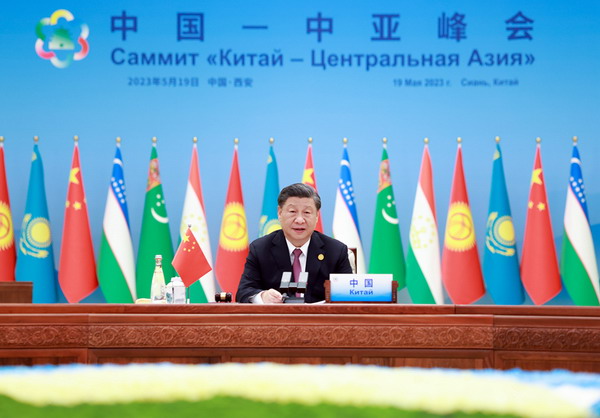
President Xi delivered a keynote speech entitled "Working Together for a China-Central Asia Community with a Shared Future Featuring Mutual Assistance, Common Development, Universal Security and Everlasting Friendship".
President Xi noted that Xi'an is an important cradle of the Chinese civilization and nation. It is also the starting point of the ancient Silk Road on the east end. With their joint endeavor of hundreds of years, Chinese and Central Asian peoples made the Silk Road expand and prosper, a historic contribution to the interaction, integration, enrichment and development of world civilizations. This gathering in Xi'an today to renew a millennia-old friendship and open up new vistas for the future is of very important significance.
President Xi recalled putting forward the initiative of jointly building a Silk Road Economic Belt back in 2013. Over the past decade, China and Central Asian countries have worked closely together to fully revive the Silk Road and actively deepen future-oriented cooperation, steering their relations into a new era. The China-Central Asia relationship is steeped in history, driven by broad actual needs, and built on solid popular support. The relations are brimming with vigor and vitality in the new era.
Changes of the world, of our times, and of the historical trajectory are taking place in ways like never before. Central Asia is at a crossroads connecting the East and West, the South and North.
The world needs a stable Central Asia. The sovereignty, security, independence and territorial integrity of Central Asian countries must be upheld; their people's choice of development paths must be respected; and their efforts for peace, harmony and tranquility must be supported.
The world needs a prosperous Central Asia. A dynamic and prospering Central Asia will help people in the region achieve their aspiration for a better life. It will also lend strong impetus to global economic recovery.
The world needs a harmonious Central Asia. Solidarity, inclusiveness, and harmony are the pursuits of the Central Asian people. No one has the right to sow discord or stoke confrontation in the region, let alone seek selfish political interests.
The world needs an interconnected Central Asia. Central Asia has the right foundation, condition and capability to become an important connectivity hub of Eurasia and make unique contribution to the trading of goods, the interplay of civilizations and the development of science and technology in the world.
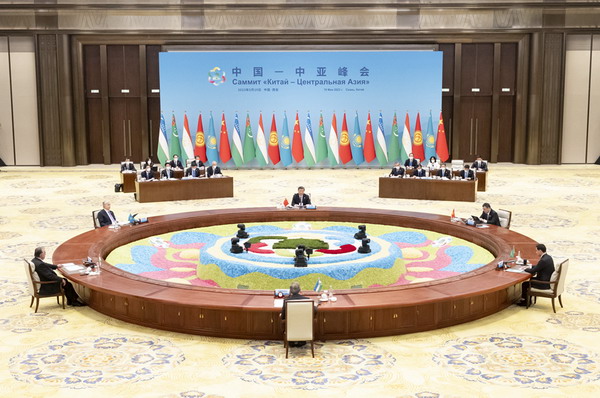
President Xi pointed out that last year, China and Central Asian countries announced the vision of a China-Central Asia community with a shared future. It was a historic choice made for the fundamental interests and bright future of all peoples in the new era. In building this community, it is important to stay committed to four principles.
First, mutual assistance. It is important to deepen strategic mutual trust, and always give each other unequivocal and strong support on issues concerning a country's core interests such as sovereignty, independence, national dignity, and long-term development. The countries should work together to ensure that their community features mutual assistance, solidarity, and mutual trust.
Second, common development. It is important to continue to set the pace for Belt and Road cooperation and deliver on the Global Development Initiative. The countries should fully unlock their potentials in traditional areas of cooperation. And they should forge new drivers of growth in such areas as poverty reduction and green and low-carbon development. They should work together to ensure that their community features win-win cooperation and common progress.
Third, universal security. It is important to act on the Global Security Initiative, and stand firm against external attempts to interfere in domestic affairs of regional countries and strive to resolve security conundrums in the region. They should work together to ensure that their community features no-conflict and enduring peace.
Fourth, everlasting friendship. It is important to implement the Global Civilization Initiative. The countries should do more to share their experience in governance, deepen cultural mutual learning, and cement the foundation of the everlasting friendship between the Chinese and Central Asian peoples. They should work together to ensure that their community features close affinity and shared conviction.
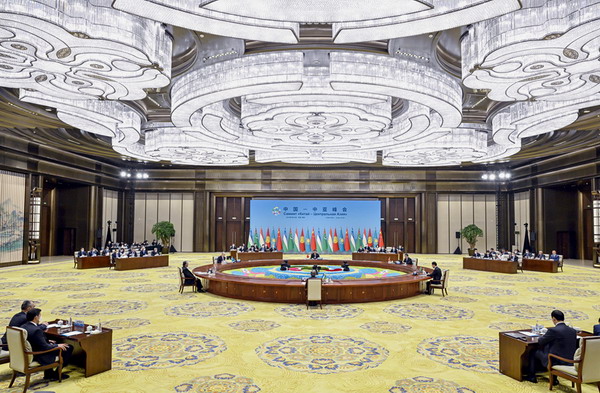
President Xi underscored that this Summit has created a new platform and opened up new prospects for China-Central Asia cooperation. China would take this as an opportunity to step up coordination with all parties for good planning, development and progress of China-Central Asia cooperation.
First, it is important to strengthen institutional building. China has proposed the establishment of meeting and dialogue mechanisms on industry and investment, agriculture, transportation, emergency response, education, and political parties, which will be platforms for all-round mutually beneficial cooperation between the countries.
Second, it is important to expand economic and trade ties. China will take more trade facilitation measures, upgrade bilateral investment treaties, and open "green lanes" for streamlined customs clearance of agricultural and sideline products at all border ports between China and Central Asian countries. China will also hold a live-streaming sales event to further promote Central Asian products, and build a commodities trading center.
Third, it is important to deepen connectivity. China will strive to increase the volume of cross-border cargo transportation, support the development of the trans-Caspian international transport corridor, promote the opening of the air transportation market, and build a regional logistics network. China will also step up the development of China-Europe Railway Express assembly centers, encourage capable enterprises to build overseas warehouses in Central Asian countries, and build a comprehensive digital service platform.
Fourth, it is important to expand energy cooperation. China would like to propose the establishment of a China-Central Asia energy development partnership. The countries should expedite the construction of Line D of the China-Central Asia Gas Pipeline, expand trade in oil and gas, pursue cooperation throughout the energy industrial chains, and strengthen cooperation on new energy and peaceful use of nuclear energy.
Fifth, it is important to promote green innovation. China will work with Central Asian countries to conduct cooperation in such areas as improvement and utilization of saline-alkali land and water-saving irrigation, build together a joint laboratory on agriculture in arid lands, and tackle the ecological crisis of the Aral Sea. China supports establishing high-tech firms and IT industrial parks in Central Asia. China also welcomes Central Asian countries to participate in special cooperation programs under the Belt and Road Initiative, including programs on sustainable development technologies, innovation and start-up, and spatial information science and technology.
Sixth, it is important to enhance capabilities for development. China will formulate a China-Central Asia special cooperation program for poverty reduction through science and technology, implement the "China-Central Asia technology and skills improvement scheme", set up more Luban Workshops in Central Asian countries, and encourage Chinese companies in Central Asia to create more local jobs. China will provide Central Asian countries with financing support and grant.
Seventh, it is important to strengthen dialogue between civilizations. China invites Central Asian countries to take part in the "Cultural Silk Road" program, and will set up more traditional medicine centers in Central Asia. The countries will speed up establishment of cultural centers in each other's countries. China will continue to provide government scholarships for Central Asian countries, and support their universities in joining the University Alliance of the Silk Road. The countries will launch the "China-Central Asia Cultural and Tourism Capital" program, ensure the success of the Year of Culture and Arts for the Peoples of China and Central Asian Countries, and open special train services for cultural tourism in Central Asia.
Eighth, it is important to safeguard peace in the region. China is ready to help Central Asian countries strengthen capacity building on law enforcement, security and defense, support their independent efforts to safeguard regional security and fight terrorism, and work with them to promote cyber-security. The countries will continue to leverage the role of the coordination mechanism among Afghanistan's neighbors, and jointly promote peace and reconstruction in Afghanistan.
President Xi pointed out that the 20th CPC National Congress laid out the central task of realizing the Second Centenary Goal of building China into a great modern socialist country in all respects and advancing rejuvenation of the Chinese nation on all fronts through a Chinese path to modernization. China will strengthen theoretical and practical exchanges with Central Asian countries on modernization, synergize development strategies, create more opportunities for cooperation, and jointly advance the modernization process of our six countries. He called for working closely together to pursue common development, common affluence, and common prosperity, and embrace a brighter future for all six countries!
Presidents of the five Central Asian countries thanked China for initiating and successfully hosting the inaugural China-Central Asia Summit, and spoke positively of the fruitful outcomes of their all-round cooperation with China. They noted that, sharing a millennia-old friendship and deep bonds, Central Asian countries and China have always been good neighbors, good friends and good partners of mutual support and mutual trust, and that Central Asian countries are China's most sincere old friends west beyond the Yangguan Pass. China has now become a crucial force for ensuring global security and stability and for promoting scientific, technological and economic development. Cooperation with China is an important factor indispensable for countries' pursuit of sustainable development. To further deepen the relations between the five Central Asian countries and China meets the common aspirations of all their peoples and the fundamental and long-term interests of the countries. The China-Central Asia Summit provides a new platform for their cooperation, bringing their relations into a new era. The parties welcome and commend China's policy of friendship and cooperation toward Central Asia. They expressed readiness to keep fully harnessing the strategic and leading role of head-of-state diplomacy, expand and strengthen the Central Asia-China Summit Mechanism, enhance top-level planning and coordination, and deepen their all-round practical cooperation with China. The goal is to deliver more benefits to the people, help the countries achieve common development and prosperity, and make due contributions to regional security and stability.
The five presidents voiced firm support for each other to choose a development path compatible with their national conditions, firmly uphold their core interests including sovereignty, independence, security and territorial integrity, and oppose interference in others' internal affairs. They spoke highly of the vision of a community with a shared future for mankind, the Global Security Initiative, the Global Development Initiative and the Global Civilization Initiative put forth by President Xi. They expressed readiness to earnestly implement the important common understandings and outcomes of this summit, use the 10th anniversary of Belt and Road cooperation as an opportunity to further synergize their development strategies with Belt and Road cooperation, advance regional connectivity and deepen practical cooperation in such areas as trade, investment, agriculture, energy, science and technology, security, and scale up people-to-people exchanges. Together, they would rise to challenges, achieve win-win cooperation and build an even closer China-Central Asia community with a shared future.
President Xi signed with presidents of the five Central Asian countries the Xi'an Declaration of the China-Central Asia Summit and adopted the List of Outcomes of the China-Central Asia Summit.
The parties agreed that the second China-Central Asia Summit be held by Kazakhstan in 2025 and that the permanent secretariat of the mechanism be set up in China.
President Xi also held a joint press conference with presidents of the five Central Asian countries.
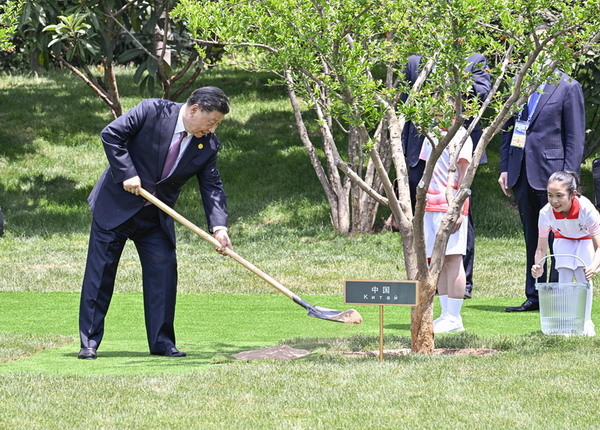
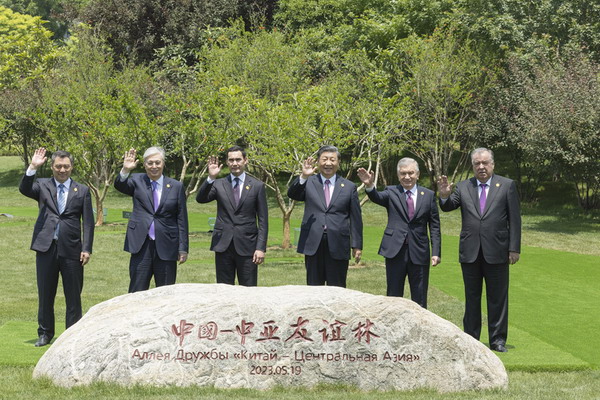
After the Summit, President Xi and his five Central Asian counterparts together planted six pomegranate trees which attest to the friendly interactions between China and Central Asia over the millennia, symbolize close solidarity and cooperation between the two sides, and reflect expectations for a better future for China-Central Asia relations.
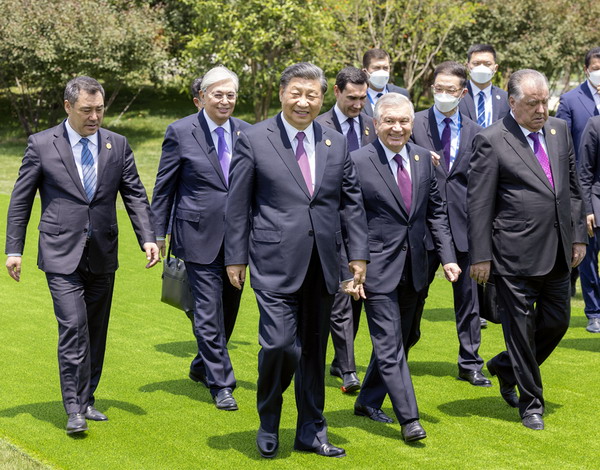
Cai Qi, Wang Yi and Qin Gang participated in the events.
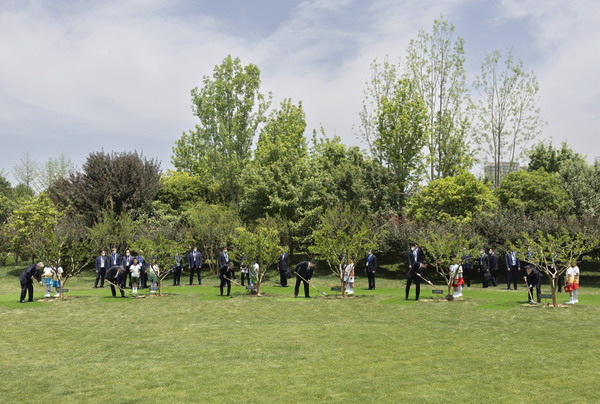

Follow us on WeChat
京ICP备18041594号-1
京公网安备 11010202005508号

Follow us on WeChat


